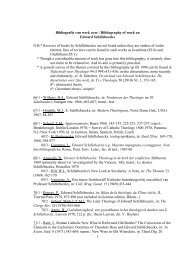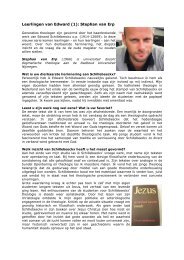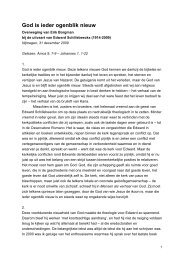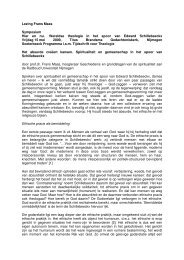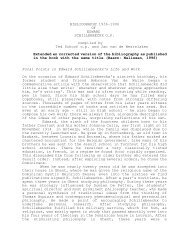Hans Hamers - Stichting Edward Schillebeeckx
Hans Hamers - Stichting Edward Schillebeeckx
Hans Hamers - Stichting Edward Schillebeeckx
You also want an ePaper? Increase the reach of your titles
YUMPU automatically turns print PDFs into web optimized ePapers that Google loves.
A key element is human reason, its critical power, and its limitations. <strong>Schillebeeckx</strong> says<br />
that even religious people cannot make sense of unmerited suffering as a part of a divine<br />
plan. Suffering cannot be handled rationally as a problem, but appears as a mystery,<br />
although you can analyse and explain some kinds of suffering and propose solutions, but the<br />
suffering as such is a mystery: “… suffering and evil in our human history are also my<br />
suffering, my agony and my death. They cannot be objectified.” and “Human reason cannot<br />
in fact cope with concentrated historical suffering and evil. Here the human Logos, human<br />
rationality fails: it cannot give any explanation.” 28<br />
This might give some insight on the experience of the suffering, whether personal or from<br />
social injustice. It is impossible to objectify it, so to ‘place it in front of me’ and leave it<br />
there for critical analysis. Although patients often speak about their illness in this rational<br />
and objectifying way, it is almost never the only way of speaking. They express that the<br />
suffering is felt inside the body. To deal with the suffering the own body is involved as the<br />
locus of the felt experience of suffering, even the suffering due to social political<br />
misconduct. I see this as the significance of the first anthropological constant of man’s<br />
corporeality.<br />
How does God come into the play? Does the evil and suffering have a ground in God?<br />
<strong>Schillebeeckx</strong> rejects an affirmative answer to this question: God is pure positivity, in favour<br />
is the life of the sinner, not his death. Critical reason has not helped us so far, we did not<br />
defeat evil. This is what our own critical rational analysis tells us. “Religious belief seeks to<br />
rescue us from this fatal experience and give our action new meaning by breaking its<br />
impotence in the light of a new possibility from God: thanks to the proclamatory<br />
reminiscence of Jesus as the crucified man who is now alive, through whom a future is given<br />
to those who have come to grief in history, even those who (for the moment) are victors at<br />
the expense of the defeated.” 29<br />
The Christian message is not an explanation for suffering. God himself did not want Jesus’<br />
death as a compensation for what we did wrong in our history.<br />
<strong>Schillebeeckx</strong> concludes: we are confronted with the fiasco of critical rational resistance to<br />
evil. Suffering brings us, believers, direct up against God. Death shows that a perfect<br />
universal salvation on earth is not possible. Salvation should be universal and complete. 30<br />
How about salvation if we still experience evil, unhappiness and suffering? It is often in the<br />
practice of spiritual care in the hospital that patient’s critical power is challenged but that it<br />
will not give them an answer for the big why-question, the question for the ground of their<br />
suffering. The experience of many patients is that their belief in a good God is in vain. They<br />
28 Ibid. p. 725<br />
29 Ibid. p. 728<br />
30 Ibid. pp. 726-727<br />
11



